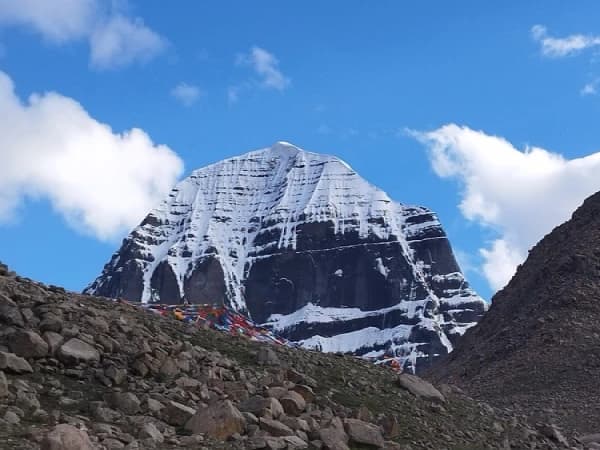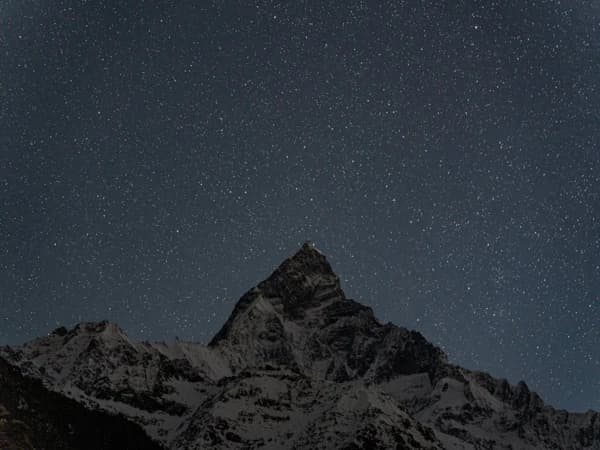Enhancing one's aerobic and physical endurance as well as becoming accustomed to carrying a daypack upwards for extended periods of time are all important components of training for Everest Base Camp. You should start hiking or going for long walks at least once a week at least 8 to 12 weeks before to your trek (concentrate more on duration than distance). Build up to being able to trek or stroll for 5–6 hours without taking many breaks.
If you live somewhere without many hills or mountains, walk hill intervals on a treadmill and stair stepper twice a week. The majority of people will also gain advantage from twice-weekly full-body strength exercises.Training for the Everest Base Camp Trek involves increasing fitness levels and developing lower and upper body strength, endurance, flexibility, longevity, cardiovascular conditioning, tolerance for thin air, and comfort with long-distance backpack-wearing hikes at high altitudes.
Before undertaking a strenuous physical endeavor like hiking to Mount Everest Base Camp, you should always see your doctor. Before beginning any exercise program, you should also see your doctor.
Can I Go To Everest Base Camp Without Training ?
Depending on how fit you are right now, you may not need to train for Everest Base Camp. For Everest Base Camp, most people will benefit from aerobic conditioning and strength endurance training. You will be walking for 5-8 hours per day and gaining, on average, 300m (1000 ft) of elevation each day, even though the trek is usually gradual and steady. You can get a fair idea of whether or not you need to prepare for Everest Base Camp by going on a couple strenuous day treks in steep terrain.
How Physically Fit Do I Need To Be To Hike To Everest Base Camp?
You must be reasonably fit to successfully complete the Everest Base Camp trip, as we detail in How Hard Is Everest Base Camp? You often hike for five to eight hours per day.
Additionally, the majority of your trekking will be uphill on the outbound trip to base camp. Only on the way back is there a significant amount of downhill.
The rising altitude is another issue you must deal with. Because your lungs are using less oxygen when you're at altitude, hiking might be challenging. Altitude sickness could result as a worst-case scenario. Near base camp, you at best feel a little out of breath, and each step demands more effort than normal.
A Hiking Success Factor
Training for Everest Base Camp is insufficient unless you have a strong will to survive for at least two weeks in the chilly mountains. Given that it is a non-technical hike, prior mountaineering experience is not necessary. The physical fitness requirements for Everest Base Camp, however, must not be disregarded. In actuality, it presents a significant obstacle to people of all ages and physical abilities. A good degree of fitness will ensure a successful hike, either before or after the Everest base camp training. In previous years, we have seen a variety of people, including the young, aged, overweight, and underweight, finish the breathtaking hike.
The altitude and the body's adaptation to the lack of oxygen are the keys to success, though. Despite the fact that anyone with a reasonable degree of fitness can climb up to Everest base camp, we advise training for a fun trip. The entire Everest base camp trek packing list is also important to be aware of as it is essential to a successful trekking journey.
How Do I Train For The Everest Base Camp Trek?
You should be prepared to endure all of them and scale the heights. Consequently, it's imperative to become physically healthy and powerful. Nothing is insurmountable with the correct conditioning. Walking is the best type of therapy to develop a camp-specific mental environment.
Therefore, as soon as you make a decision, begin climbing upward for 3-5 hours at least twice every week. Carry a backpack that weights 10 to 20 pounds when you are on foot. This will assist you in getting ready to walk while carrying weight.Then, start a training regimen that helps you increase your strength and endurance at home or in the gym. Start off slowly with your fitness program and gradually increase it. One can gradually pump more in terms of weight carrying capacity, speed, and duration.
Additionally, hiring a local trainer to lead fitness courses is a good idea. The trekker will be able to get specialized advice on improvements that come within his or her purview as a trekker thanks to this specific plan.
Start with a treadmill walk if you're at home and don't have an instructor. You can accelerate gradually. But pay attention to how long. You can walk slowly for 5-7 hours while trekking to Everest Base Camp, but you should cover big distances in a day.
The next thing you ought to do is use the stairs rather than the elevator. Your thigh muscles will contract as a result, and your legs will become stronger.
Physical Training And Fitness Required For Everest Base Camp Trek
We advise you to perform the following training regimen on a weekly basis leading up to your trek:.
1. Practise Hikes
Your trekking trip will be excellent if you practice short walks because it trains your body to travel far distances. You'll be able to break in your hiking boots and learn about the strain an actual hike will put on your knees. Even if you skip the other exercises on your training schedule, you can hike. You will be able to complete your Everest climb without experiencing any difficulty if you can do at least 3 to 4 small hikes with a minimum duration of 5 to 6 hours.
Training Schedule (2x weekly)
- Hike or go for a long stroll
- Ascend to 5–6 hours with short pauses.
- When feasible, choose terrain that is hilly and uneven.
- Wear your daypack and gradually add weight to it until it weighs 25 pounds.
2. Cardiovascular Workouts
Cardiovascular exercise is physical activity that develops the heart and lungs. Running, swimming, cycling, and rowing are some of the most typical (and well-liked) cardio exercises.
Weekend workouts should last several hours, especially the closer you get to your climb date. Your cardio workouts during the week should last at least an hour. On the EBC journey, keep in mind that you will be hiking for several hours each day.
Building total strength is beneficial, especially in the lower back, abdominal area, legs, and upper back. It is also rewarding to perform bodyweight exercises, free weights, gym routines, or backpack workouts.
3. Strength Training
Although strengthening the leg muscles is not as crucial as aerobic or cardiovascular conditioning, it will help you enjoy your trek more. Therefore, we advise following a training schedule that combines strength training with a hike to Everest base camp. Each body component must be physiologically capable of supporting a backpack for five to six hours of walking. When you combine lift training with aerobic activities, you can achieve it. We suggest the following exercises to strengthen your legs:
- Step-ups
- Squats
- Pull-ups
- The bench press
- Leg curls (forward and backward) Push-ups
- Lunges
- Deadlifts
- Horizontal presses
It is crucial to perform the workouts correctly because doing so can be harmful to your health. Legs are without a doubt the most important body portion when exercising. However, it's also important to condition the upper body. And the reason for this is because you will have to carry your personal belongings and equipment all the way up to the base camp. We advise the workouts listed below to help strengthen the upper body:
- Sit-ups
- Shoulder presses
- Rows with kettlebells
- Fly back and shoulders
You must progressively change your attention during the training process to gaining strength, endurance, and both mental and physical energy. It is crucial that you vary the amount of weight you utilize during each training phase. Additionally, it's crucial that you have adequate rest periods in between each session of the workout you perform. To avoid strains or injuries, maintaining perfect form is equally crucial while engaging in any exercise phase.
4. Mental Preparation
Preparing yourself mentally is just as important as physical training. The Everest Base Camp trek can be physically demanding and mentally challenging. Practice mindfulness and meditation techniques to build mental resilience and focus. Visualize yourself successfully completing the trek, envisioning the breathtaking landscapes and the sense of accomplishment that awaits you.
5. Aerobic Workouts
The goal of aerobic exercise is to increase heart rate. This is a highly beneficial component to incorporate into your preparation for the EBC trip as it enables your body to operate effectively with less oxygen.
Here are a few low-cost, extremely effective cardio exercises:
- Stairway moving
- On-the-spot, kneeling running
- Box jumps
- Jumping jacks
- Burpees
- Doing squat jumps
You might also enroll in a regular Zumba, spinning, aerobics, or comparable class at your neighborhood gym. If your aerobic exercise leaves you panting heavily and out of breath, you're doing it well.
General Fitness For The Trek To Everest Base Camp
All things considered, the following information will help you prepare for the Everest Base Camp trek:
- Back-to-back workouts that involve hiking while carrying a specific weight.
- Spend a minimum of two to three hours climbing at least 1,000 meters with a backpack carrying between 12 and 18 kg.
- For a week or two, progressively increase the weight each day.
- Work up gradually while wearing a large pack, thick boots, or hiking shoes when working out indoors.
- To exercise at a gym, use a step-mill machine that resembles a moving staircase.
- You will need to include extra gym workouts if your neighborhood lacks minor hills or mountains.
- During the training period, pay close attention to your body's needs by scheduling at least one rest day each week.
- Reduce your exercise intensity progressively during the last week of training to give yourself time to recuperate and emotionally and physically become ready.
- Before you set out on the real hike, you will need to train for anything between three and five weeks.
Begin Your Altitude Training For Everest Base Camp., When The Tour Begins
- On each day of your walk, try to consume 3 to 4 liters of water minimum.
- Avoid drinking alcohol and smoking while on the hike.
- Don't forget to take preventative medications when they are really necessary.
- Instead of pushing much higher when ascending to greater elevations, hike in short sections.
- Even if you hike higher in a day, always be sure to sleep lower down.
- Finally, choose only a reputable trek organizer and/or guide who will come to your aid in case of an emergency while you are in the mountains.
Which Level Of Difficulty Is The Trek To Everest Base Camp?
1. Trek length
A minimum of nine days of nonstop hiking, plus a few days for acclimatization, depending on the route of the walk.
2. Trek distance
A minimum of 4 to 4.5 miles of trekking must be completed each day to ascend, and a minimum of 9 to 11 miles must be hiked to return to base camp.
3. Weight of the bag
Carrying your own rucksack filled with necessities for the walk, which would weigh between 11 to 15 pounds (5 to 7 kg).
4. Hiking elevation
Trekking with an oxygen deprivation of up to 30% for the entire trek, at altitudes between 2,500 and 5,500m (8,200 and 18,045 feet).
Conclusion of Preparing for Everest Base Camp
It's critical to consider the Base Camp journey in its proper context. Despite the distance (more than 120 km round trip), we'll travel at a sedate and steady pace. Over 11 days—8 days up, 3 days down—we lead the hike. You'll relax and acclimate to the altitude for two days on the ascent, and the majority of days will be spent trekking for 5-8 hours at a leisurely pace. Each day, we'll climb an average of 300m (1000 ft) in elevation. We have lots of time and want to take in the scenery. The easiest approach to safely enjoy the journey and reduce the effects of altitude sickness is to go slowly and steadily.
FAQs About Everest Base Camp Training
How difficult is the trek to Everest base camp?
The Everest Base Camp journey is a moderately difficult journey that doesn't call for specialized mountaineering knowledge. The actual ascent to the elevation of 5,364m/17,599ft is a long climb. The journey is therefore exhausting only due to its length and the altitude rise over a variety of terrains. Training for at least three to four weeks before a trek will help you get through the difficult parts at high altitudes.
Can I trek to Everest base camp without any prior trekking experience?
Definitely, sure. You are welcome to go trekking to Everest Base Camp with us as long as you get in touch with us ahead of time so we can set up some fundamental training sessions for you. We'll also need to know about your past medical history and everyday routine. If you get in touch with us at least three months before the walk, we may give you advice on the necessary training. We may potentially refuse your interest in the walk based on your medical history, but this is extremely uncommon.
Is acclimatization required for the trek to Everest base camp?
Acclimatization refers to adjusting to a new environment or set of circumstances. In order to acclimatize on this trek, it is necessary to rest the body at lower elevations. Acclimatization is a vital necessity for all hikers and climbers in order to avoid experiencing altitude sickness. You never know because Acute Mountain Sickness (AMS), which can affect anyone regardless of age, health, or physical characteristics.
After finishing my climb to Everest base camp, would I lose weight?
You will eat wholesome meals while on this walk, whatever is conveniently offered at the teahouses. While it is usual for trekkers to lose between 7 and 10% of their body weight, some are able to compensate by eating healthily and getting enough sleep. We, on the other hand, encourage all climbers to consume as much food as they can, for which we offer a well balanced diet throughout the entire journey to base camp.
Should I prepare while carrying my bag, or will there be a porter on the trek?
Carry a small backpack while exercising and move over the uneven, uphill road. Local sherpas hired as porters can assist you with some weight (up to 25 kg), but you should at least carry your little rucksack filled with essentials.
What essential equipment should you be familiar with as you prepare for a trek to Everest Base Camp?
Just as crucial as preparing the body for physical endurance is having enough clothing. Merino wool layers and comfy garments are essential. Rest and sleep that can withstand temperatures as low as minus 30 degrees centigrade can be an unavoidable instrument to resist the terrible weather. For your climb to Everest Base Camp, you'll need to wear gloves, a down jacket, hiking boots, trekking pants, and other outfits. So, while beginning your fitness program, you should feel comfortable wearing these. Hiking boots are the most essential item. In order to avoid blisters or stiffness, always remember to take a break from wearing your hiking boots.The highest quality boots that provide exceptional ankle support, breathability, waterproofing, an elastic-free sole, low weight, and warmth are the best for hiking. But spend money on a pair of warm boots that offer warm ankle support.







